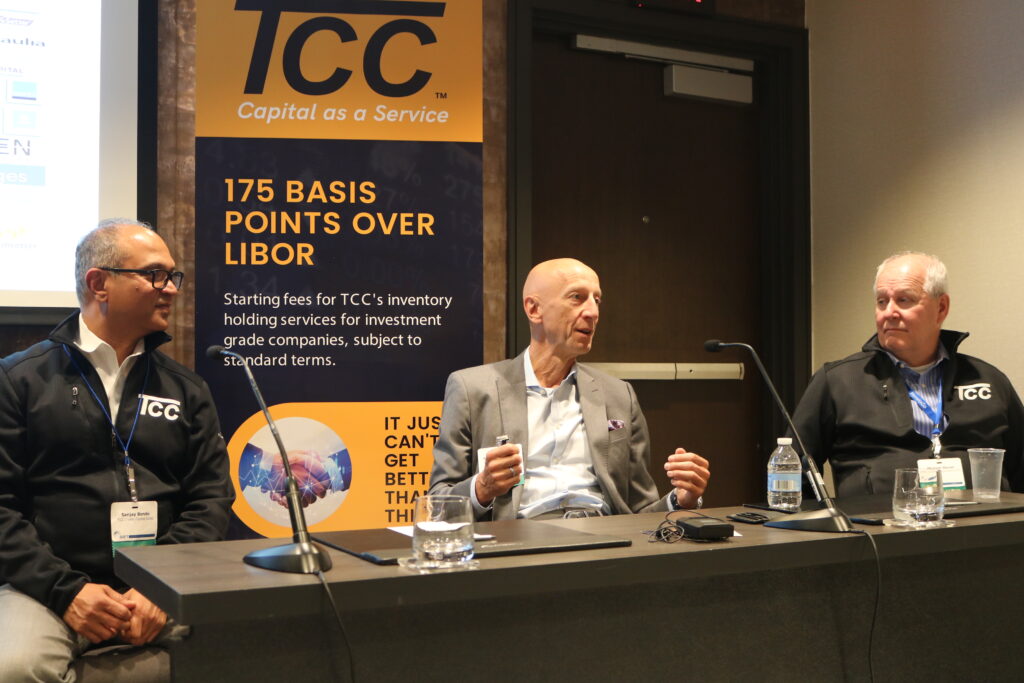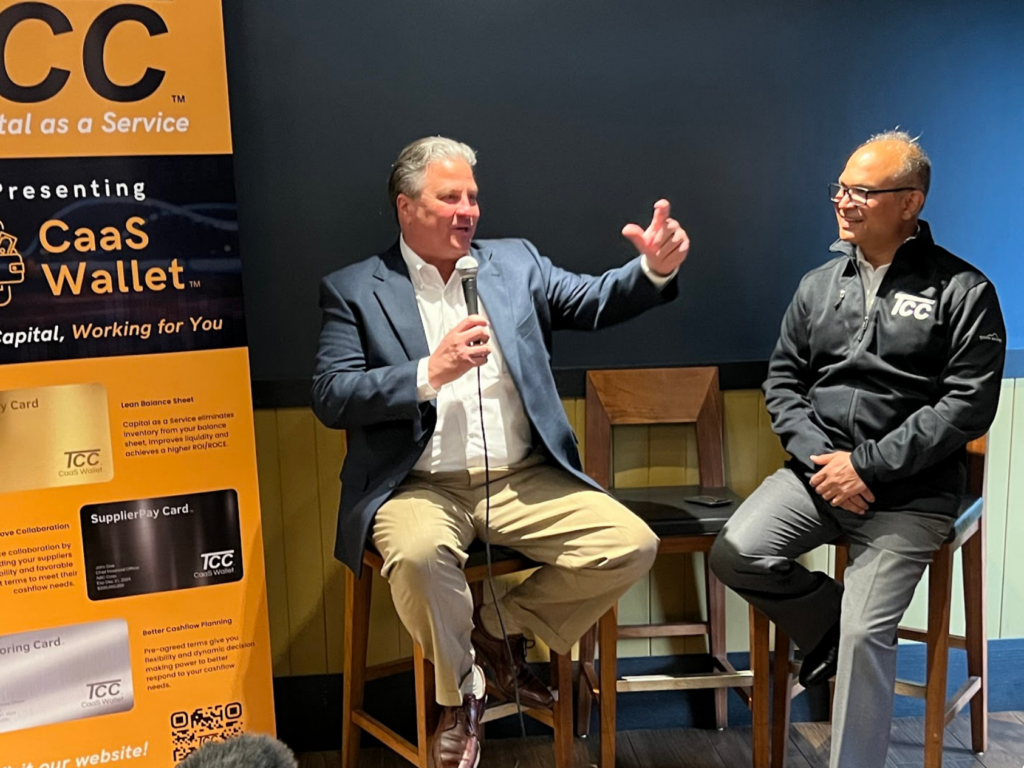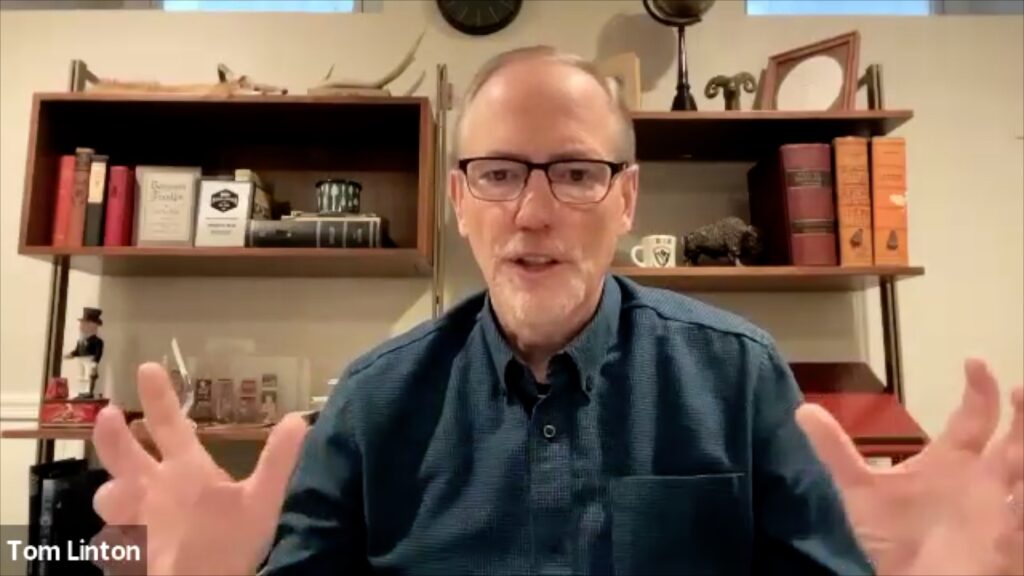Trade Capital Corporation
News and press releases
For press inquiries please contact us at tcc@1tcc.com
Article, March 2025
Press Release, August 2, 2024
Press Release, July 22, 2024

Press Release, December 20, 2023

Press Release, October 11, 2023

Press Release, Sep 18, 2023

Press Release, Aug 29, 2023

Press Release, May 11, 2023

Press Release, May 03, 2023

Press Release, March 20, 2023
Press Release, February 10, 2023

Press Release, January 10, 2023

Press Release, November 28, 2022

1TCC™ is expanding its executive leadership team with the addition of Poorva Diwekar as its Treasurer and Vice President of Finance
Press Release, July 26, 2022

Capital as a Service solution enables fintech and banking to expand investment grade business
Press Release, May 17, 2022

Capital as a Service offering to revolutionize inventory with off-balance sheet funding
Press Release, April 22, 2022
Suite of trade funding options positioned to empower C-suite and Supply Chain execs
Press Release, April 5, 2022

1TCC™ convenes industry leaders to discuss best practices in change management, inventory control
Press Release, February 18, 2022

Seven reasons OEMs are primed for innovation in inventory finance
Press Release, December 22, 2021

Trade Capital Corporation Releases 2022 Forecast
Seven reasons OEMs are primed for innovation in inventory finance
December 22, 2021
- The pandemic and its aftershocks will continue to be a major element in shaping the global economy as the recovery is fragile and uneven across the world with many regions showing vulnerability to setbacks.
- Surging global demand across multiple sectors, labor shortages, highly favorable financing conditions, supply chain disruptions, and soaring energy prices have become key themes associated with the COVID-19 aftermath.
- Surging global demand across multiple sectors, labor shortages, highly favorable financing conditions, supply chain disruptions, and soaring energy prices have become key themes associated with the COVID-19 aftermath.
- Capital access will continue to be heavily underwritten by supportive fiscal and monetary policy, economic growth will ease back.
- The Fed is projected to hike rates up to three times in 2022 and 2023, starting in June 2022 until it reaches the terminal rate of 2.3% in May 2024 according to a recent CNBC survey
- Elevated asset prices with the S&P 500 Index near bubble territory and home prices accelerating away from rents suggest housing-market risks are bigger than at any time since the sub-prime crisis back in 2007.
- The impact from higher inflation will continue to ripple throughout the economy in the near term and possibly far into the future.
- The Consumer Price Index climbed by 6.8% in the year through November, marking the fastest pace of inflation in nearly 40 years.
- Elevated inflation persisting for several years could ripple through the economy, slowing GDP growth as consumers’ household budgets are constrained, and the Federal Reserve needing to raise interest rates risks impacting the equity markets and interest-sensitive industries.
- Surging prices for food, energy and shelter accounted for much of the increase.
- Consumer-price inflation will drop to 3.4% by June of next year and then to 2.6% by the end of 2022.
- Global supply chain disruptions, which have negatively impacted growth and resulted in high levels of inflation, will continue to weigh on the economy through much of 2022.
- The supply chain bottleneck is one of the biggest threats to growth in the next 12 to 18 months along with, and to a lesser extent, continued labor shortages
- The largest retailers, including Walmart and Target, increased inventories by double digits year-over-year in expectation of continued supply chain disruptions for the holiday season. This dynamic could very well permeate across the supply chain networks of their manufacturers, suppliers and distributors as well.
- This dynamic is the result of strong consumer demand throughout the pandemic coupled with COVID-19 related supply disruptions
- This dynamic is the result of strong consumer demand throughout the pandemic coupled with COVID-19 related supply disruptions
- The continued semiconductor shortage will result in a demand/supply imbalance causing ripple effects across multiple industries that use computer chips in our digitalized world.
- An escalation in rhetoric between mainland China and Taiwan could potentially result in China sanctioning Taiwan and cause a disruption in Taiwan’s production of the semiconductors crucial to the global output of everything from smartphones to cars.
- The United States is building new fabs, however, given the required lead time, supply will not catch up with demand next year.
- The shortage has resulted in increased prices for new and used cars aligned with the decline in car production.
- An escalation in rhetoric between mainland China and Taiwan could potentially result in China sanctioning Taiwan and cause a disruption in Taiwan’s production of the semiconductors crucial to the global output of everything from smartphones to cars.
- Prolonged China slowdown will have economic consequences for the countries linked with China through trade.
- The accumulated overhang of the Evergrande real estate slump, repeated Covid lockdowns and energy shortages dragged annualized economic growth down to 0.8%, well below the 6% pace to which the world has become accustomed and the 2022 real GDP growth forecast is 4.9%.
- Real estate is an important sector of the Chinese economy, accounting for ~30% of overall demand.
- China’s increasingly pivotal position in the global economy, particularly in relation to commodity and industrial demand, also means that any significant change brings risk of broader contagion and volatility.
- Rising geopolitical threats and political turmoil in Europe will drive volatility.
- Solidarity between leaders supporting the European project and the effectiveness of the EuropeanCentral Bank helped keep government borrowing costs under control to manage the Covid crisis – both of these could go away in 2022.
- Presidential elections in France and Italy could raise sovereign risks among key European nations by causing panic in the European bond markets depending on who gains power.
- Negotiations between the U.K. and EU over the Northern Ireland Protocol, a doomed attempt to square the circle of an open land border, and a closed customs union, are set to come to fruition in 2022- if negotiations break down, the uncertainty would hit business investment and undermine the pound as demonstrated by previous Brexit outcomes.
About Trade Capital Corporation (TCC)
Trade Capital Corporation, based in Menlo Park, California, enables its clients to access dedicated and non-dilutive capital so they can focus on growth and innovation objectives. TCC’s Capital-as-a-Service solution unlocks liquidity and enhances its clients’ capital efficiency by funding and holding inventory until it is needed, helping companies achieve a lean-asset balance sheet while ensuring a seamless experience throughout the entire working capital lifecycle. TCC’s global leadership team has deep experience in strategic finance, supply chain management, and financial asset management – and has successfully raised large sums of both debt and equity capital. TCC sees significant opportunity to serve the needs of OEMs and manufacturers as demand for off-balance sheet inventory funding is magnified by the pandemic.
References
- https://www.spglobal.com/_assets/documents/ratings/research/100772320.pdf
- https://www.bloombergquint.com/amp/global-economics/omicron-inflation-evergrande-10-biggest-risks-to-the-global-economy-in-2022
- https://www.cnbc.com/2021/12/14/the-fed-will-halt-asset-purchases-by-march-and-hike-rates-in-june-cnbc-survey-predicts.html
- https://www.wsj.com/articles/supply-chain-bottlenecks-elevated-inflation-to-last-well-into-next-year-survey-finds-11634479202
- https://www.cnbc.com/2021/12/14/the-fed-will-halt-asset-purchases-by-march-and-hike-rates-in-june-cnbc-survey-predicts.html
- https://www.forbes.com/sites/stevebanker/2021/11/03/the-economic-outlook-for-2022-will-be-impacted-by-supply-chain-and-labor-issues/?sh=156ed02d3f1e
- https://www.morganstanley.com/ideas/global-macro-economy-outlook-2022














